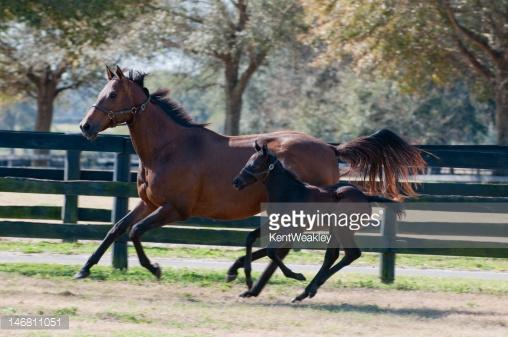Ulcers are a common medical condition that occurs in horses and in foals. It is believed that up to half of all foals and more than 30% of adult horses who are confined to their stalls may have at least mild ulcers. Up to 90% of race horses may develop a severe ulcer at least once in their lives.
It is such a common occurrence that a syndrome and disease have been named because the development of ulcers is so common. Knowing how to treat ulcers in horses means understanding how a gastric ulcer can develop. If you treat the root cause, you’ll be able to treat the ulcer.
What Are the Signs and Symptoms of an Ulcer in Horses?
Horses that are suffering from an ulcer will typically experience intermittent colic. This will typically occur after they nurse or after they eat. You may also notice a reduced appetite, the desire to eat roughage for only short periods of time, or a change in nursing behavior.
Horses that have a moderate-to-severe ulcer will also tend to grind their teeth more often. You may also notice an excessive amount of saliva around their mouth as their bodies try to compensate for the higher levels of stomach acid. The added fluids can also lead to frequent diarrhea for the horse.
Foals who experience a stomach ulcer have also been known to lie on their back as a way to experience relief.
Adult horses may experience light colic symptoms, weight loss, and have a declining body condition. You may also see attitude changes in the horse and they may not perform as well. Some may choose to lie down more frequently than normal. There can also be changes to the animal’s coat.
\nWhen I count my blessings I count that my horse likes sleeping in his hay more so than sleeping in the mud twice pic.twitter.com/R9pWtMEnCt
— Bay Horse Sass (@grayhsass) November 6, 2016
What Are the Common Causes of Ulcers in Horses?
There are multiple reasons why a horse may develop an ulcer of any severity. The most common reason tends to come from fasting. Horses eat many small meals throughout the day because of their grazing habits. This prevents stomach acid build-up. If the horse is kept in the stall without enough hay, then this involuntary fasting can create an ulcer rather quickly.
Here are some additional reasons why an ulcer may develop.
- The horse is being given the wrong type of feed. Horses eat a lot of roughage because it stimulates saliva production. This added saliva works to water down or neutralize the stomach acid. Certain types of roughage tend to provide better results. Alfalfa tends to be the most recommended roughage because of its calcium count.
- The horse is getting extra exercise. When a horse is given more exercise than normal, it tends to cut into their feeding times. This means there are more fast times and fewer opportunities to chew roughage. Added exercise may also increase the amount of time it takes for the stomach to empty itself, which can promote a higher level of retained stomach acid.
- The horse is taking medications that stimulate stomach acid. When horses take NSAID pain relievers, it can stimulate acid production because the activity of the medicine blocks a chemical which controls the amount of stomach acid that is produced.
Many of the causes of an ulcer can be relieved by correcting one of the situations described above. Over the course of 7-14 days, once the cause of the ulcer has been removed, the horse will begin to heal.
\nclipping rant over here's a pic of my pretty 75% clipped horse pic.twitter.com/ciCpMRM2vw
— vet tech student (@readysetride) November 6, 2016
Effective Treatments for All Stomach Ulcers in Horses
Medications and changes in horse management practices tend to provide the best treatment plan in most circumstances. Every situation is unique, so the veterinarian and owner will need to evaluate the medical history and clinical signs of the horse to develop a specific protocol. This will lead to a plan that decreased acid production, buffers the acid that does get created, and protects the lining of the stomach.
There are four general treatment options that will be used. They are remarkably similar to the treatment options that are used for humans when there is a suspected ulcer as well.
- H2 Blockers. This medication blocks the action of histamines within the horse. Histamine is known to stimulate stomach acid production.
- Antacids. Although on their own, this buffer isn’t a practical treatment for an ulcer because of the large amounts that are necessary for a successful experience, they can be helpful in “as needed (PRN)” situations.
- Protein Pump Inhibitors. This type of medication limits the product of acid in the stomach. They may sometimes be used with short-term antacids to prevent a horse from experiencing discomfort.
- Sucralfate. This medicine can help to protect the stomach lining by preventing the acid from contacting it. The horse must receive this medicine before it begins to consume food for it to be effective. It may not protect the upper portion of the stomach as well as the bottom portion of the stomach.
In addition to these medical options for treatment, there will likely need to be a change in the management of the horse. Increasing the amount of daily roughage that the horse receives occurs in almost every situation. There may also need to be an increasing in the number of feeding times given to the horse so that there are fewer fasting situations.
If you have a pasture where the horse can be turned out, then this is considered to be a viable alternative to increased stall feedings.
It is also generally recommended to reduce or avoid feeding whole grains to the horse until the ulcer improves or heals. Vegetable oil, vitamin supplements, and mineral treats can replace the missing calories from the whole grains so the ulcer is not bothered by the digestive process required for the other feed.
Some veterinarians may also recommend adding probiotics to the horse’s diet in order to aid in the digestive process.
Which Treatment Option is Right for You?
Most foals who experience an ulcer will be able to have it heal without needing ongoing treatment for it. In adult horses, the bothersome signs and symptoms from an ulcer can begin to improve in as little as 24-48 hours once a treatment plan is implemented. The immediate relief can sometimes cause an owner to stop treating the ulcer, but this will only complicate the issue. Stopping a treatment earlier than recommended by a veterinarian may cause the ulcer to not be able to completely heal.
Every horse reacts to an ulcer in a little bit different of a way. By managing the symptoms, making management changes, and incorporating an effective medication protocol with a veterinarian’s assistance, knowing how to treat ulcers in horses doesn’t have to be a headache. Use this guide to speak with your veterinarian so that together you can choose the best course of action that will be able to restore the health of your horse.




